Almost exactly a year ago, Cherwell published its first ‘Sextigation’. Now, after multiple weeks of data collection and over 400 responses, Cherwell’s sex survey is back again for 2023.
In an almost exact parallel to last year’s survey, the (mean) average Oxford student in 2023 has had 5 sexual partners since coming to Oxford. However, the types of averaging we choose to use can tell a very different story, because some particularly active individuals massively skew the mean. The mean female student has had 4.3 sexual partners since coming to Oxford, but the median has had 1.5. The mean male has had 5.9, but the median is 2. For nonbinary students, the mean is 4.8, but the median is 3.
Significantly 43.7% of students have had one or no sexual partners since coming to Oxford, with 16.9% having had no sex since matriculating, and 8.6% of students being virgins. Ultimately, what this survey shows us is a ‘tale of two cities’: one half highly promiscuous, the other having had very few sexual partners.
Indeed, those who are having sex seem to be having a lot of it. A whopping 17.3% of students claimed to have had sex with two or more people at once, with 56 respondents owning up to a threesome, 10 to a foursome, 9 to a fivesome, and 1 to a sixsome.
This year, 50.4% of respondents identified as heterosexual, 30.7% bisexual, and 11% homosexual, lesbian, or gay. The remaining 8% identified as queer, asexual, pansexual, didn’t know, or preferred not to say. This is surprisingly similar to the results yielded by a survey run by Cambridge’s Varsity paper, where “49.7% of the respondents identified as heterosexual, whilst 11.9% and 29.7% identified as homosexual and bisexual respectively.” One Oxford student who seems to be having a little too much fun on their year abroad termed themself “Españiosexual”.
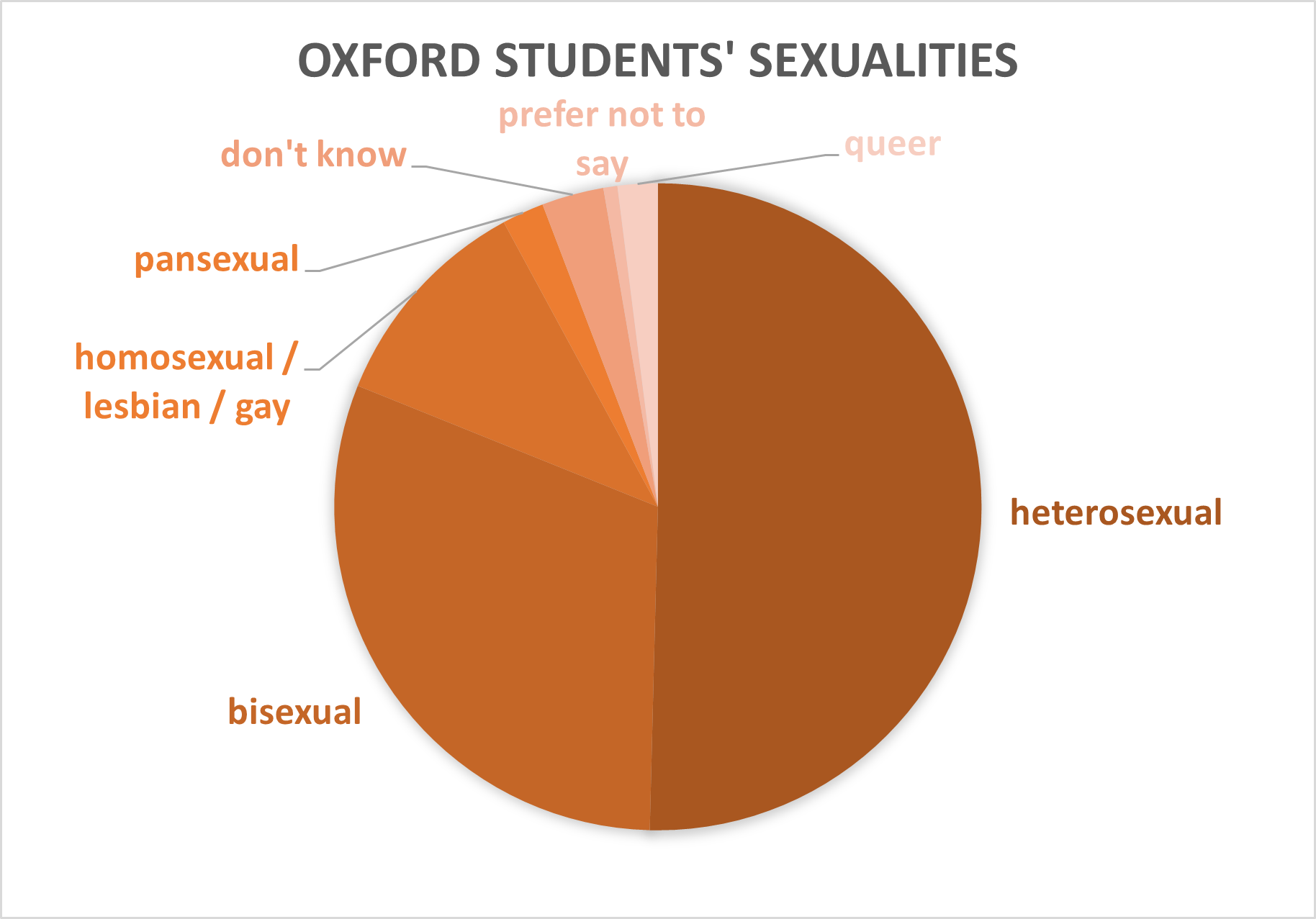
There seems to be a significantly different experience of sex at Oxford based on students’ sexual orientation. The mean straight student has slept with 3.1 people since coming to Oxford, but for the median student, this number reduces to 1. For those who identified as queer, the mean post-matriculation body-count is 6.96, with a median of 3. Multiple respondents attested to “a huge gay hookup culture”, with Plush being voted the best club for finding a one-night-stand. As one slightly less eloquent respondent put it, “Grindr go brrrrr”.
The overall impression that the survey has given of Oxford’s sex scene is decidedly ‘mid’. One respondent went as far as to say, “the only good sex I had in Oxford was with a Warwick student”, whilst another remarked, “the odds are good… but the goods are odd”. A majority of students rate their sex lives at 3/5 or below, a value that stays consistent across all sexualities and genders. However, different colleges show markedly different satisfaction levels: the mean Teddy Hall student rates their sex life 4/5, but those at Univ award it a measly 2.9/5.
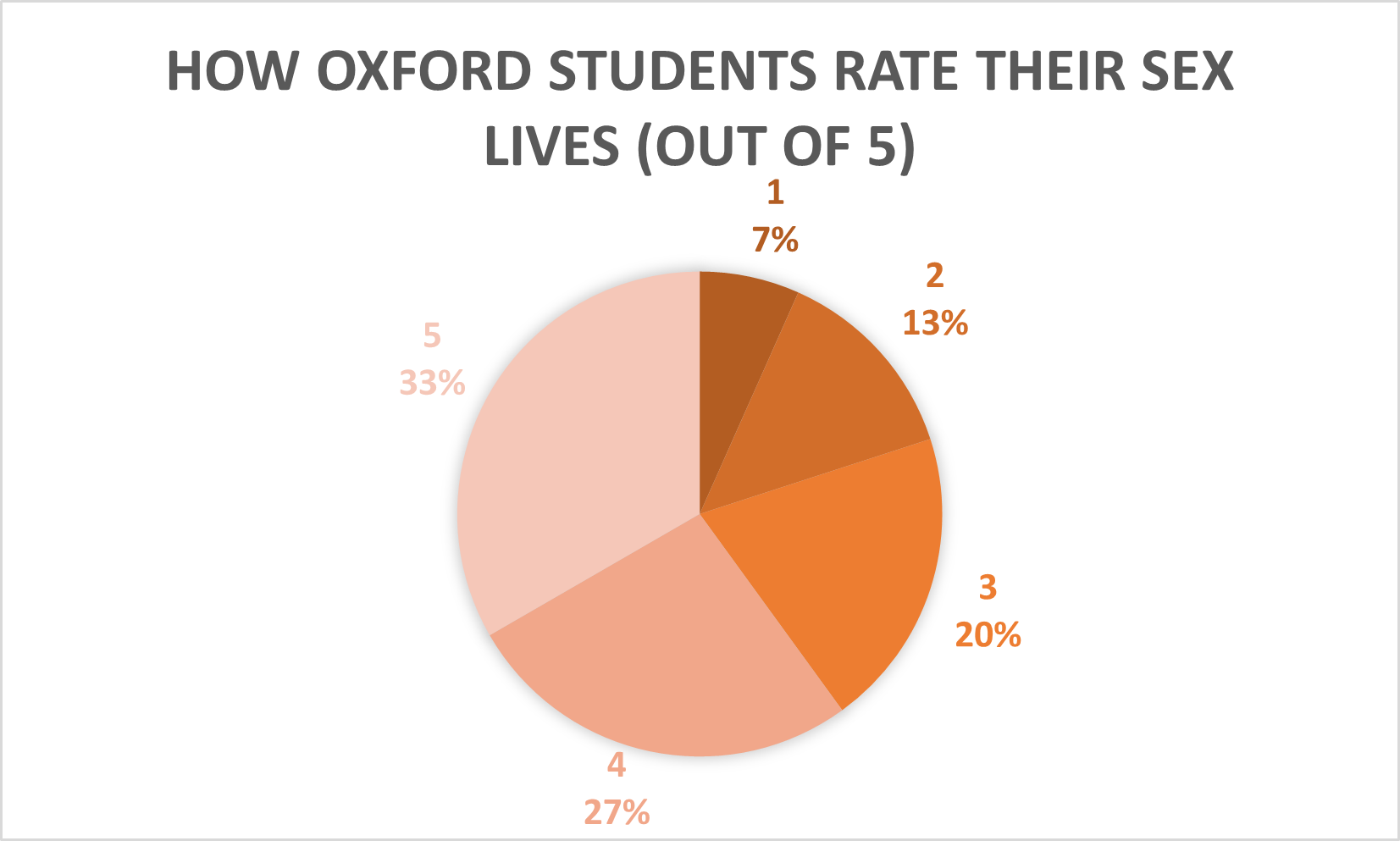
This variety of satisfaction ratings may owe to the fact that when it comes to colleges, some seem to be hosting a lot more action than others. St Peter’s came in as the college with the highest mean bodycount, at 13.5 since Oxford, 17 total. It seems that when the phrase “Merton is where fun goes to die” was coined, “la petit morte” may have landed surprisingly close to the truth, since in a surprising turn of events, the colleges with the next highest mean bodycounts were Merton (12.5 since Oxford, 14 total), Christ Church (7.8 since Oxford, 16.7 total), Magdalen (7.3, 11.5), and Teddy Hall (6.6, 10.5). However, since the median Mertonian has a bodycount of 0, it is fair to say that some have been skewing the stats. Indeed, none of these colleges made it to the top 5 last year, and Magdalen was relegated to the five that “get the least action” in 2022. It seems that a lot can change in a year.
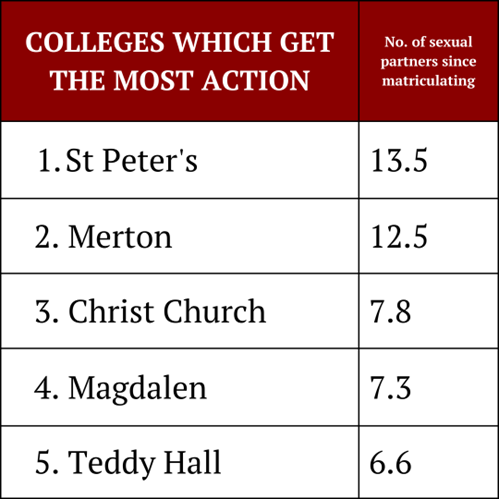
As for the colleges seeing the least sex, the bottom five were Univ (1.4 since Oxford, 2.5 total), Somerville (1.9, 2.9), St Hugh’s (1.9, 3.4), Lincoln (2.8, 3.9) and Pembroke (3.1, 4.3). We want to give an honourable mention to LMH, with a mean body count of 4.8 since coming to Oxford, but which reduces to 0.4 when we exclude one very prolific but anomalous undergrad.
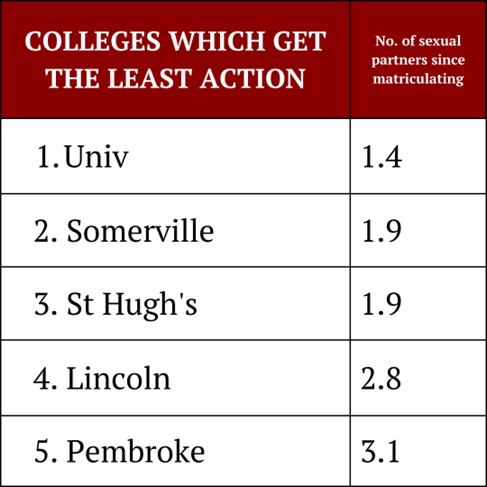
As for subjects, it’s perhaps time to stop sympathising with the medics, who have still found time to be the top-shagging degree with a sizeable average of 16.4 partners since coming to Oxford. They are unsurprisingly followed by E&M (15.8, 22.3), Theology (8.4, 11.6), Music (8.1, 10), and Geography (8, 10). Four out of five of these subjects are new to the top rankings, replacing last year’s “degrees which get the most action”, English and modern languages, law, ancient and modern history, and biochemistry. However, Theology students have retained their title for another year.
Psychology comes in as the subject having the least sex, with a mean of 1 sexual partner since coming to Oxford and 1.9 in total. They are followed by maths (1.4, 2.1) and engineering (2.2, 3.5). The high performance of just two Computer Science respondents has lifted them out of the bottom spot that they occupied in 2022.
However, a low body count should not be read as an absence of sex. When asked “If you are currently in a relationship of any kind, how often do you have sex with your partner?”, 47.2% of respondents claimed to be sleeping with their partner at least once a week. With a quarter of respondents having had a relationship with someone of the same college, it seems that action does not need to come from one night stands. Hertford has seen the greatest number of incidents of college-cest, with 46.7% of their respondents having had a same-college relationship. They are followed by Trinity (37.5%), Linacre (35.7%), and Balliol (28.6%).
Perhaps more importantly, a lack of sexual partners does not necessitate a lack of sexual pleasure. 3 in 4 Oxford students masturbate at least once a week. However, masturbation statistics varied wildly by college, with 95% of Magdalen students pleasing themselves at least weekly, but 57.1% of St John’s students masturbating ‘rarely’.
Casual sex does not see overwhelming popularity amongst Oxford students. 40.1% of respondents said they had never had a one night stand. For those who had, Plush was rated the best club for pulling, with 24.4% of the vote, followed by Parkend / Atik at 19.3%.
With 44.8% of students having had sex in a public place, clubs are clearly not the only place for a hook-up. Our most interesting sex spots include many a college chapel (shout-outs to Exeter and Wadham), the LMH talbot laundry, Christ Church porters’ lodge, St John’s squash courts, Lincoln Entz cellar and college library, Magdalen deer park, Worcester gardens, and the Catz moat (we’re hoping next to and not in it). Students also testified to “head on the Oxford Tube”, using “a remote vibrator at a college formal”, and having sex with someone who “had a life-size cardboard cutout of Tony Blair in his bedroom”.
Fortunately, the more insidious side of hook-up culture, such as both prude-shaming and slut-shaming, seems to be disappearing, with low numbers of respondents testifying to the presence of either. However, when broken down into gender, there are still identifiable disparities in students’ sexual experiences. Only 1/5 of total respondents claimed that there is a pressure to engage in hook-up culture, but this increased to nearly 1/4 among men. Conversely, whereas 27.8% of overall respondents believe there is a slut-shaming culture, this increased to 33% among women.
The range of statistical responses we gained told us a complex story, ranging from tales of Oxford’s top shaggers with total body counts in the 100s to testimonies from those who remained happily and proactively chaste. The comments clearly revealed that Oxford’s sex scene is perceived differently by all who do (or don’t) participate in it; yet the overall results suggest that sex is not as significant a factor in most Oxford students’ lives as might be assumed. As one person pithily remarked, it’s “very vanilla”.
Issues of college accommodation come into play here, as one person complains “squeaky single beds against paper thin walls kinda ruin having sex in my own space”, but several others put it down to being overworked. In a wider sense, the insularity of the university space is also a concern: “casual sex is relatively easy to come by in Oxford but often chaotic and emotionally challenging – especially when you have to keep bumping into that person for the rest of your degree”.
This idea of an incestuous dating pool is echoed by others: “everyone knows everyone – you have to keep up”. One person refers to the “whole thing about work making it ‘too hard’ to form a meaningful monogamous relationship”, while another grumbles that they’re “too busy thinking about my essays to have casual sex”, and one ambitious Blue puts it down to “high workload and sports commitments”.
But amongst complaints about casual sex, many attribute a lack of sex to difficulties in maintaining a relationship. As one person aptly analogised: “trying to sustain a relationship in this place is like trying to eat soup with a fork”.
The logistics of making time for dating, sex, and relationships at a University where even scheduling sleep into a 24-hour period is a struggle for some seems to be overwhelming. There are perhaps questions to be asked about the shifting attitudes to balancing ‘work and pleasure’ as an Oxford student: the decades-long mantra of ‘First, Blue, or a Spouse’ seems to have been swayed in a direction that favours the former whilst devaluing the latter.
However, a ‘lack of time’ for relationships seems to be only a small part of the problem. A recurrent complaint amongst our respondents is the misleading duality of Oxford’s reputation, as someone writes “I think Oxford is a place of both intense sexual excitement and shyness. It’s known for being both a city of nerdiness and a city of debauchery”. Recent initiatives like Oxshag (“for the overworked and undersexed”) have attempted to capitalise on this situation, aiming, in the words of its founder, to “spice up the Oxford casual sex scene (which is underwhelming and/or hard for a lot of people)”. Indeed several comments affirmed this stance, with someone writing “If I was single, I cannot imagine where I would meet people outside of using hookup apps”.
What these platforms have brought to light is the difficult co-existence of cultures of peer-pressure to have sex and slut-shaming. In the course of the survey, Oxford has been compared to both “love island” and “a city of nerdiness”, with one person lamenting that “There’s no space for people who want meaningful relationships but also casual flings with interesting people”. They go on to say, “You’re either a slut or married. There’s no in-between and it’s extremely polarising and awful for the culture”.
For most of those who do feel peer pressure to have casual sex, the pressure is often more subtle. One person suggested sex is “so prevalent and often talked about that those who don’t participate may feel that they are missing a part of their ‘university experience’”. Another person responded that the pressure is “not explicit but [there are] feelings of exclusion if not involved”. Someone else makes the argument that “casual sex is standardised, and many feel that traditional relationships are boring or unviable”. These pressures are embedded in our social activities, from crew dates which “valorise being a shagger and having funny sex stories” to Bridge and Atik, where there’s a “pressure to hit the club and hook up”.
The story looks slightly different when considering the dating experience of LGBTQ+ respondents. One respondent said, “I think a lot of LGBTQ+ identifying individuals start exploring their sexuality at university, so there’s a notion of ‘jumping in at the deep end’ that straight people don’t really have”. Another said their experience was “originally a bit traumatic; there was a real pressure to take part in that scene when I wasn’t ready.”
Another wrote, “Oxford is a tolerant city but a lot more closeted than I expected. The small size of colleges means rumours spread quickly so people are less likely to come out.”
A different respondent stated that “women seem less likely to date a bi man here”. However, they finished by saying “I’ve had a lot more sex at uni than my straight friends and acquaintances though.”
“Casual sex culture feels more pressured than with my straight friends,” said one student. This seems to be a common theme throughout responses, with another noting, “I think there is more hook-up culture for men who have sex with men.”
Hookup pressure is the most common comment, with another telling us: “Sometimes I feel like there’s more pressure to get with more people to prove your queerness, but I’m okay with not adhering to this anymore. I know I’m attracted to women and I don’t need to make out with one every other week to prove that.”
Many respondents were candid about the additional challenges attributed to their LGBTQ+ identity. One respondent told us that “As a demisexual person, it’s hard to meet people enough to form a relationship because there isn’t enough time or opportunity”, and another told us that “As a gay man, Body shaming and pressure to be skinny aka a twink is very common.”
“I think if you’re queer but not very outwardly queer presenting then it would be very hard to be noticed by other queer students. I find that I’m not entirely comfortable with other queer students because I feel like I am not queer enough around them (which may just be a general issue).”
These challenges seemed harshest for trans people. One said, “being gay and trans makes hookups a very strange prospect, most of my prospects are people I already know.” Additionally, “dating/hooking up as a gay trans person is hard, because you worry about how people perceive you and whether or not it’ll be safe, whilst also worrying about how having to acknowledge your own body too. If you find someone that’s supportive, though, that makes things a lot easier.”
However, there were positive comments too: “I have found dating quite easy in Oxford. I appreciate that the other person will have a similar workload to me, and therefore it is important to designate discrete times to see each other. This works very well for me as someone who likes to compartmentalise my day. I don’t think this is much different to how heterosexual relationships must work in Oxford.”
All in all, our survey has told us that whilst there do seem to be sex ‘trends’ at Oxford, every respondent’s experience is different. Initial surprise at the high mean average bodycount of students was replaced by equal surprise at the low median. Whilst the picture is not as clear-cut as one in which “Oxford students don’t get laid”, there is no formula that can be applied across the student body. Perhaps most interesting was the fact that lots of those having little sex assumed that they were in the minority, whilst many of those having lots of it thought that Oxford was not very accommodating for casual hook-ups. One student told us that “I feel guilty for putting so many ‘no’ and ‘not applicable’. I really need a therapist to tell me that being a virgin is ok here in Oxford.” In contrast, another told us that “there is a bit of a cliché that Oxford students should have a lot of sex to alleviate stress.” It seems that Oxford doesn’t really have a strong sex culture, either pro or anti, yet our respondents frequently measured themselves against standards that simply don’t exist. In reality, sex doesn’t seem to be a defining aspect of University life after all.
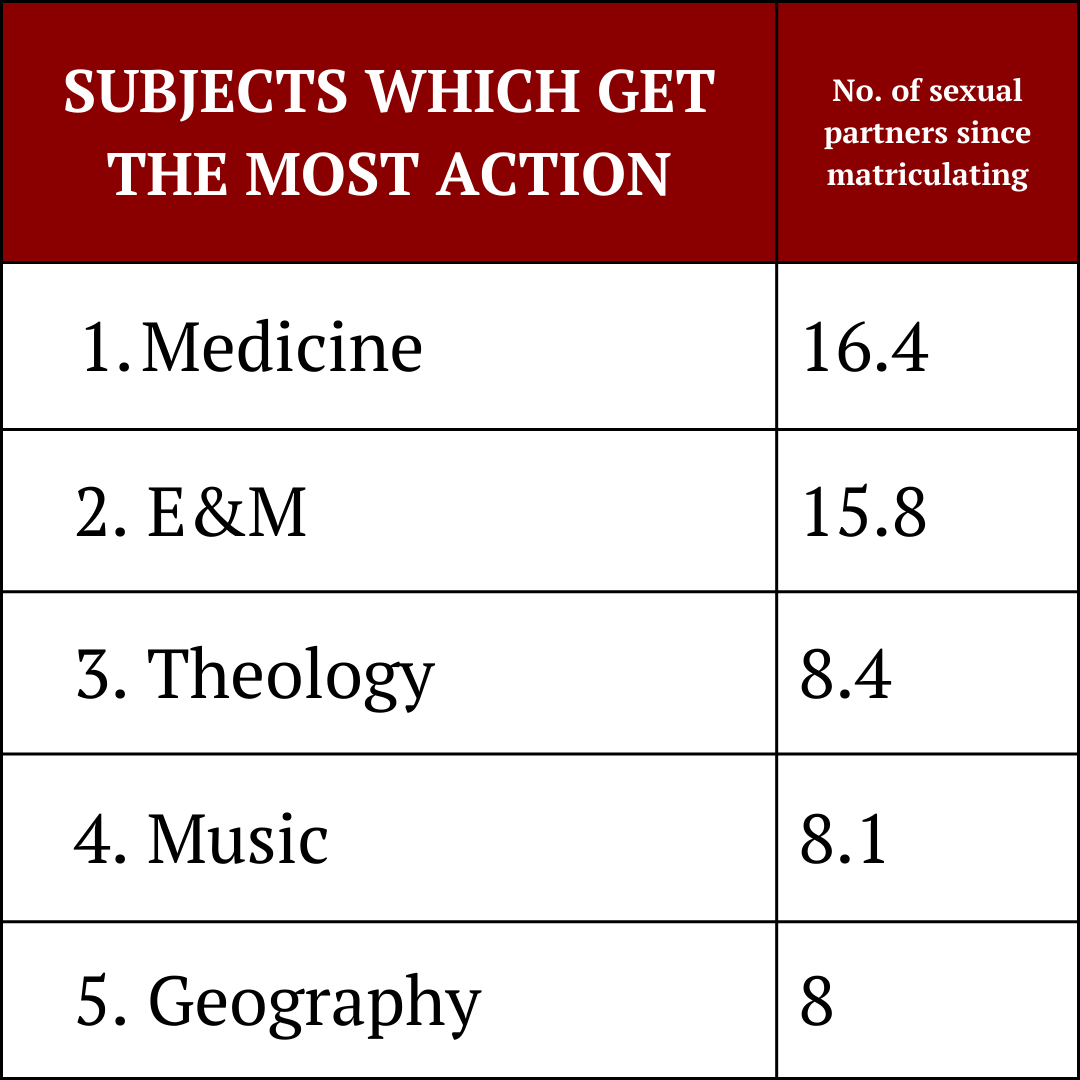

Image credits:
Interactive map: Charlie Hancock
Charts and tables: Meg Lintern
Cover image: W.S. Luk


